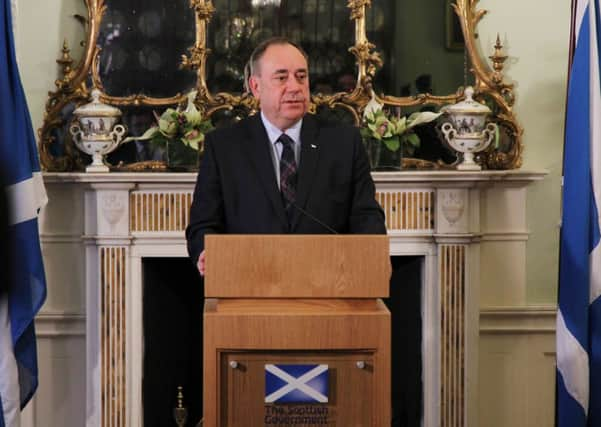Profile: Alex Salmond’s date with destiny


As a student of medieval history and economics he listened as his then girlfriend, the secretary of the Labour Club, told him: “if you feel like that go and join the bloody SNP!” He did, the very next day.
Advertisement
Hide AdAdvertisement
Hide AdWhen Salmond joined the party it was a political sideshow, populated by the impassioned but largely unelectable, yet in thirty years he turned it into party of government capable of persuading almost half the population of Scotland to side with succession.
Born on New Year’s Eve in 1954, the second child of four children to two civil servants Robert Salmond and Mary Stewart, Salmond was raised in a council house and educated at Linlithgow Academy before going on to study at St Andrews University. After graduation, he joined the civil service at the Scottish Office and worked as an assistant economist at the department of Agriculture and Fisheries before going on to join RBS as economist with a focus on North Sea oil.
While at the Scottish Office, he met his boss and future wife Moira, who, at 43-years-old and 17 years his senior, he wed in 1981. They had no children and Salmond concentrated on furthering his political career. He was elected at the SNP MP for Banff and Buchan in 1987 and quickly made a name for himself as a young parliamentarian by heckling Nigel Lawson as he delivered the budget which led to Salmond being evicted from the chamber.
On the left wing of the SNP, Salmond was a close ally and friend of Jim Sillars and secured the leadership of the party in 1990. However, his plan to lead an “army” of SNP MPs to Westminster following the 1992 General Election ended in tatters when the party secured just three. At Westminster he was a vocal critic of the bombing of Serbia, which he described as being “of dubious legality” and an act of “unpardonable folly”. He was also a critic of the Iraq War. Gordon Brown, an arch critic, would often describe him and his policies as “Alex in Wonderland”.
However, it was the formation of the Scottish Parliament in 1999 that would ultimately be the making of him, but not in the early years - he resigned the leadership in 2000 after a decade in charge. John Swinney took over as leader but stepped aside in 2004 to allow Salmond to return after a poor showing in that year’s election.
Within three years Salmond led the SNP to form a minority government at Holyrood and then in 2011 he stunned the political establishment by securing a landslide victory which made the SNP the majority party at the Scottish Parliament, something that had previously been considered an impossibility.
It was this majority that granted the party the credibility to seek a referendum on independence.
In his spare time, Mr Salmond is a keen gambler and previously wrote a racing column for The Scotsman. He is an accomplished golfer and self-confessed ‘Trekkie’.
Advertisement
Hide AdAdvertisement
Hide AdAs one opponent said of him: “You can’t win against Alex because he doesn’t really understand losing. He can’t make a distinction between triumph and failure. Even if he loses his head won’t go down. He takes it seriously that Scotland was independent for 1,000 years before the Union. He’s currently the best ‘waiter’ in world politics.”
SEE ALSO